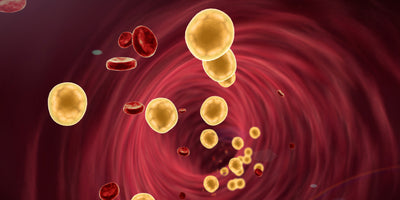
How Hydration Can Boost Your Cognitive Performance
Introduction
Have you ever noticed how a glass of water can sometimes feel like a magic potion for your tired brain? In the hustle and bustle of our daily lives, we often overlook the simplest ingredient vital for our cognitive health: water. Hydration, or the lack thereof, has a profound impact on our brain's functionality, influencing everything from our memory to our ability to concentrate. While most of us are aware of the general health benefits of staying hydrated, the specific advantages for our cognitive performance are less commonly discussed. This article delves into the science behind hydration and its critical role in enhancing cognitive abilities, offering insights and practical advice on how to harness the power of water to boost brain power. By understanding the connection between hydration and cognitive performance, we can make informed choices that support our mental agility and overall well-being.
The Science of Hydration and Brain Function

Our brains are highly dependent on proper hydration to function optimally. Comprising approximately 75% water, this vital organ relies on a delicate balance of fluids to regulate everything from thought processes to emotional responses. Water facilitates the production of neurotransmitters, the chemical messengers that transmit signals between brain cells, and hormones that are crucial for brain function. It also plays a key role in maintaining brain temperature, ensuring that it operates efficiently and effectively.
Moreover, hydration aids in the removal of toxins and waste products from the brain, a process essential for maintaining cognitive health. The glymphatic system, a unique cleanup mechanism in the brain, operates most efficiently during sleep and requires adequate hydration to perform optimally. This system's function is critical for preventing the buildup of proteins associated with neurodegenerative diseases like Alzheimer's.
Research has consistently shown that even mild dehydration can impair cognitive functions such as concentration, alertness, and short-term memory. A study published in the "Journal of Nutrition" found that a fluid loss of just 1-2% of body weight (which can occur through normal daily activities) can significantly affect cognitive performance. This level of dehydration is common and often goes unnoticed, highlighting the importance of regular water intake for maintaining cognitive function.
Hydration's influence on the brain is both immediate and long-term. Short-term, adequate water intake can help maintain attention and focus, particularly important during tasks that require sustained concentration. Long-term, staying hydrated is believed to contribute to the overall health of brain cells, potentially lowering the risk of cognitive decline and diseases related to aging.
Understanding the intricate relationship between hydration and brain function underscores the importance of regular water intake as part of a healthy lifestyle. By staying adequately hydrated, we can support our brain's ability to perform at its best, enhancing our cognitive capabilities and protecting our mental health over time.
Dehydration and Cognitive Decline: A Detailed Analysis
Dehydration's impact on the brain can range from mild cognitive impairments to severe health consequences. Even mild dehydration, often unrecognised, can lead to noticeable deficits in cognitive abilities. These include challenges with memory retention, difficulty focusing on tasks, reduced decision-making skills, and a decrease in motor coordination. A study from the "American Journal of Clinical Nutrition" highlights that dehydration affects not only cognitive performance but also mood and concentration levels, particularly in young women and men.
The mechanisms behind this decline involve dehydration's effect on the brain's structure and function. When dehydrated, the brain tissue loses water, leading to a temporary shrinkage of brain cells. This physical change can disrupt the communication between neurons, making cognitive processes like memory formation, problem-solving, and attention more difficult. Additionally, dehydration can lead to an imbalance in electrolytes, such as sodium and potassium, which are critical for transmitting signals between nerve cells.
Recognising the signs of dehydration is crucial for preventing these cognitive deficits. Symptoms can include thirst, dry mouth, tiredness, headache, and dizziness. However, thirst is not always a reliable indicator, as it often appears after dehydration has already begun to affect the body and brain. Therefore, regular water intake throughout the day is essential, especially during activities that increase fluid loss, such as exercise or exposure to high temperatures.
Optimal Hydration Levels for Peak Brain Performance
Maintaining optimal hydration is key to enhancing cognitive function and overall brain health. While individual hydration needs can vary based on factors like age, sex, weight, physical activity, and environmental conditions, general guidelines suggest that women should aim for about 2.7 liters (91 ounces) of fluids per day, and men should aim for about 3.7 liters (125 ounces) per day from all beverages and foods. However, these recommendations can serve as a starting point, with adjustments made based on personal needs and daily circumstances.
Incorporating hydration habits into daily routines can ensure consistent water intake. For instance, starting the day with a glass of water, drinking water before each meal, and carrying a reusable water bottle can help meet hydration goals. Additionally, consuming fruits and vegetables with high water content, such as cucumbers, tomatoes, oranges, and watermelons, can contribute to overall fluid intake.
Hydration Strategies for Enhanced Focus and Concentration
Adopting effective hydration strategies can significantly improve focus and concentration, particularly during periods of intensive mental activity. Simple practices include:
- Setting reminders: Using apps or timers as reminders to take hydration breaks can help maintain consistent water intake throughout the day.
- Optimising the workspace: Keeping a water bottle within sight and reach at a desk or workstation encourages regular sips, even during busy work periods.
- Monitoring urine color: Urine color can be a practical indicator of hydration status, with pale yellow indicating good hydration and dark yellow signaling the need for more fluids.
- Balancing caffeine consumption: While caffeinated beverages can contribute to daily fluid intake, moderation is key, as excessive caffeine can lead to dehydration.
Implementing these strategies can not only boost cognitive performance but also enhance overall productivity and well-being.
The Role of Hydration in Stress Reduction and Mental Health
The connection between hydration and mental health is profound, with adequate water intake playing a crucial role in stress reduction and emotional well-being. Chronic dehydration can lead to an increase in cortisol levels, the body's primary stress hormone. This hormonal imbalance not only exacerbates stress but can also impact mental health conditions like anxiety and depression. Hydration supports the production of neurotransmitters, such as serotonin and dopamine, which are essential for mood regulation and stress resilience. By maintaining proper hydration, individuals may experience a decrease in stress levels and an improvement in mood, contributing to overall mental health and cognitive performance.
Hydration Strategies for Enhanced Focus and Concentration
Effective hydration is key to maintaining focus and mental clarity. Incorporating simple habits into your daily routine can make a significant difference in your cognitive function:
- Regular Water Breaks: Make it a habit to take short breaks specifically to drink water, especially during long periods of work or study.
- Hydrate with Meals: Drinking water before or during meals not only aids digestion but ensures you regularly consume water throughout the day.
- Use a Water Bottle: Having a water bottle on hand makes it easier to remember to drink water, especially if it’s a bottle you like and will use often.
- Flavor Your Water: If you find plain water unappealing, adding natural flavors like lemon, cucumber, or mint can make hydration more enjoyable and likely.
The Impact of Hydration on Sleep Quality and Cognitive Recovery
Good hydration habits can positively affect sleep quality and, by extension, cognitive function. Adequate fluid intake ensures that the body's natural repair processes, which are most active during sleep, function efficiently. Dehydration can lead to disrupted sleep patterns, including difficulties in falling asleep and staying asleep, due to physical discomforts like dry mouth or throat and nocturnal leg cramps. Furthermore, proper hydration supports the glymphatic system, a waste clearance system in the brain that operates optimally during sleep, playing a critical role in removing toxins associated with neurodegeneration. Therefore, maintaining hydration can enhance sleep quality, facilitating better cognitive recovery and performance.
Technology and Hydration Tracking: Tools for Cognitive Enhancement
In today's digital age, technology offers innovative solutions for tracking hydration and encouraging regular water intake. Various apps and smart devices can help individuals monitor their daily water consumption, set reminders to drink water, and even track the volume of water consumed. For example, smart water bottles equipped with sensors can alert users when it's time to hydrate, directly supporting cognitive health by promoting consistent hydration habits. By leveraging these technological tools, individuals can easily integrate effective hydration practices into their daily routines, ensuring optimal cognitive function and overall well-being.
Summary
- Physiological Importance of Hydration: Water is essential for neurotransmission, regulating brain temperature, and removing toxins, which are crucial for optimal brain function.
- Effects of Dehydration: Mild dehydration can impair memory, attention, executive function, and mood, leading to noticeable deficits in cognitive abilities.
- Optimal Hydration Levels: General guidelines suggest about 2.7 liters of fluids per day for women and 3.7 liters for men, but individual needs may vary based on various factors.
- Hydration Strategies for Focus: Regular water breaks, hydrating with meals, using a water bottle, and flavoring water can enhance focus and concentration.
- Hydration and Mental Health: Adequate hydration can reduce cortisol levels, support neurotransmitter production, and improve mood and stress resilience.
- Hydration and Sleep Quality: Proper hydration supports sleep quality and the brain's waste clearance system, facilitating cognitive recovery and performance.
- Technology for Hydration Tracking: Apps and smart water bottles can help monitor daily water intake and remind users to stay hydrated, promoting cognitive health.









